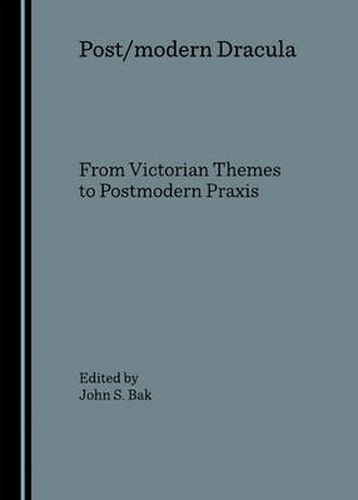Readings Newsletter
Become a Readings Member to make your shopping experience even easier.
Sign in or sign up for free!
You’re not far away from qualifying for FREE standard shipping within Australia
You’ve qualified for FREE standard shipping within Australia
The cart is loading…






Post/modern Dracula explores the postmodern in Bram Stoker’s Victorian novel and the Victorian in Francis Ford Coppola’s postmodern film to demonstrate how the century that separates the two artists binds them more than it divides them. What are the postmodern elements of Stoker’s novel? Where are the Victorian traits in Coppola’s film? Is there a postmodern gloss on those Victorian traits? And can there be a Victorian directive behind postmodernism in general? The nine essays compiled in this collection address these and other relevant questions per the novel and the film at three distinct periods: (post)modern Victorianism, post/modernism, and finally postmodernism.Part I on (post)modernist issues in Stoker’s novel establishes the link between Victorian themes and postmodern praxes that begins with colonialist concerns and ends with poststructuralist signification. Part II looks at the post/modernist traits in Stoker’s Dracula, those obviously influenced by modernism but also, with the help of the novel’s plasticity vis-a-vis the media over the last century, by postmodernism. Part III examines more closely the novel’s postmodern characteristics, particularly with respect to Coppola’s 1992 film, Bram Stoker’s Dracula. Dracula defies time and promises to undermine any critical study of it that precisely tries to situate it within a given epoch, including a postmodernist one. Given its relationship to late-capitalist economy, to post-Marxist politics, and to commodity culture, and given its universal appeal to human fears and anxieties, fetishes and fantasies, lusts and desires, Stoker’s novel will forever remain post/modern-always haunting our future, as it has repeatedly done so our past.Though scholars of Dracula and Gothic literature in general will find some of the essays innovative and engaging per today’s literary criticism, the book is also intended for both an informed general reader and a novice student of the novel and of the film. As such, a few essays are highly specialized in postmodern theory, whereas others are more centered around the sociohistorical context of the novel and film and use various postmodern theories as inroads into the novel’s or the film’s study.
$9.00 standard shipping within Australia
FREE standard shipping within Australia for orders over $100.00
Express & International shipping calculated at checkout
Post/modern Dracula explores the postmodern in Bram Stoker’s Victorian novel and the Victorian in Francis Ford Coppola’s postmodern film to demonstrate how the century that separates the two artists binds them more than it divides them. What are the postmodern elements of Stoker’s novel? Where are the Victorian traits in Coppola’s film? Is there a postmodern gloss on those Victorian traits? And can there be a Victorian directive behind postmodernism in general? The nine essays compiled in this collection address these and other relevant questions per the novel and the film at three distinct periods: (post)modern Victorianism, post/modernism, and finally postmodernism.Part I on (post)modernist issues in Stoker’s novel establishes the link between Victorian themes and postmodern praxes that begins with colonialist concerns and ends with poststructuralist signification. Part II looks at the post/modernist traits in Stoker’s Dracula, those obviously influenced by modernism but also, with the help of the novel’s plasticity vis-a-vis the media over the last century, by postmodernism. Part III examines more closely the novel’s postmodern characteristics, particularly with respect to Coppola’s 1992 film, Bram Stoker’s Dracula. Dracula defies time and promises to undermine any critical study of it that precisely tries to situate it within a given epoch, including a postmodernist one. Given its relationship to late-capitalist economy, to post-Marxist politics, and to commodity culture, and given its universal appeal to human fears and anxieties, fetishes and fantasies, lusts and desires, Stoker’s novel will forever remain post/modern-always haunting our future, as it has repeatedly done so our past.Though scholars of Dracula and Gothic literature in general will find some of the essays innovative and engaging per today’s literary criticism, the book is also intended for both an informed general reader and a novice student of the novel and of the film. As such, a few essays are highly specialized in postmodern theory, whereas others are more centered around the sociohistorical context of the novel and film and use various postmodern theories as inroads into the novel’s or the film’s study.